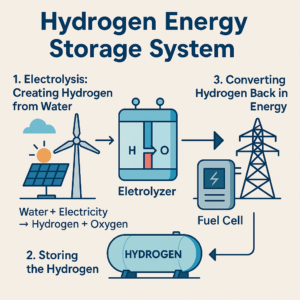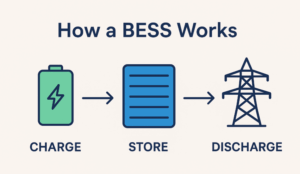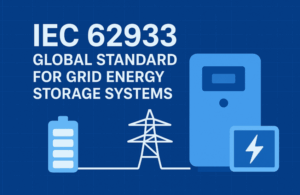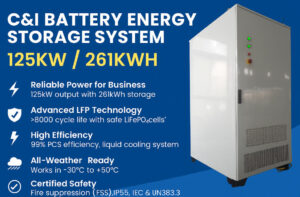Solving the Intermittency Challenge: The Role of Battery Energy Storage Systems in Renewable Energy Integration
In recent years, renewable energy sources such as solar and wind power have gained significant traction as viable alternatives to traditional fossil fuels. However, these sources of energy come with a unique challenge—intermittency. Unlike conventional power plants, solar and wind farms are dependent on weather conditions and can only generate electricity when the sun is shining or the wind is blowing. This intermittency poses a hurdle in integrating renewable energy into the existing power grid. To address this challenge, battery energy storage systems (BESS) have emerged as a promising solution. In this blog post, we will explore the role of BESS in renewable energy integration and how they can help overcome the intermittency challenge.
Understanding the Intermittency Challenge
Renewable energy sources are inherently variable due to their dependence on weather patterns. Solar panels produce electricity only during daylight hours, while wind turbines generate power when wind speeds are optimal. This intermittent nature of renewable energy generation can result in supply fluctuations and grid instability. To ensure a reliable power supply, it is crucial to bridge the gap between energy production and demand. This is where battery energy storage systems come into play.
The Basics of Battery Energy Storage Systems
Battery energy storage systems consist of large-scale batteries that store excess electricity generated during periods of high production. These systems can be charged when renewable energy generation exceeds demand and discharged when there is a shortfall. By acting as a buffer, BESS enables the smooth integration of renewable energy into the grid.
Stabilizing Grid Operations
One of the primary roles of BESS is to stabilize grid operations. Traditional power plants can quickly adjust their output to match the fluctuations in demand. With the help of battery storage, renewable energy sources can also provide this flexibility. When renewable generation exceeds demand, excess energy is stored in the batteries. During periods of low or no generation, the stored energy can be discharged to maintain a steady power supply. This balancing act helps in grid stability and reduces the need for relying on backup fossil fuel-based power plants.
Smoothing Variability
Renewable energy sources, especially wind, and solar, are known for their inherent variability. Cloud cover, wind gusts, and seasonal changes can all impact generation levels. Battery energy storage systems help smooth out this variability by absorbing excess energy during peak generation periods and releasing it during low generation periods. This ensures a consistent and predictable energy supply, making renewable sources more reliable and grid-friendly.
Mitigating Power Outages
Power outages can have severe economic and societal implications. In the event of a blackout, BESS can provide backup power by seamlessly transitioning to stored energy. This capability not only ensures an uninterrupted power supply but also reduces the reliance on fossil fuel-powered backup generators. In areas prone to natural disasters or remote regions with limited access to the grid, battery energy storage can play a crucial role in maintaining essential services and improving overall resilience.
Facilitating Renewable Energy Integration
The integration of renewable energy sources into the grid has traditionally been a complex process. The variable nature of renewables requires careful planning and coordination to ensure a stable and reliable power supply. Battery energy storage systems simplify this integration by absorbing excess generation and releasing it when needed. This flexibility makes it easier to incorporate a higher share of renewable energy into the grid without compromising grid stability.
Reducing Curtailment
Curtailment refers to the practice of deliberately reducing renewable energy generation when supply exceeds demand. This occurs due to the lack of storage options to absorb the excess energy. Battery energy storage systems can significantly reduce curtailment by providing a means to capture and store surplus energy. Instead of wasting renewable resources, this excess energy can be stored and utilized during times of low generation, maximizing the overall efficiency and utilization of renewable energy sources.
Enhancing Energy Market Dynamics
Battery energy storage systems are not only beneficial for grid operators but also for energy market dynamics. By allowing for more efficient use of renewable energy, BESS can help reduce overall energy costs. During periods of high demand and peak energy prices, stored energy from batteries can be supplied to the grid, thereby reducing reliance on expensive peak-load power plants. This market participation of BESS can contribute to a more stable and competitive energy market.
Advancements in Battery Technology
The increasing demand for energy storage has driven significant advancements in battery technology. Lithium-ion batteries, for example, have become the leading choice for large-scale energy storage due to their high energy density, long cycle life, and fast response times. Continued research and development in battery technology are expected to lead to further improvements, making BESS even more efficient and cost-effective.
Future Outlook
As the world transitions towards a more sustainable energy future, battery energy storage systems will play a vital role in enabling the seamless integration of renewable energy sources. The declining costs of battery technology, coupled with favorable policies and incentives, are expected to accelerate the deployment of BESS worldwide. The combination of renewable energy and battery storage holds tremendous potential for reducing greenhouse gas emissions, enhancing grid resilience, and creating a more sustainable energy system.
Conclusion
The intermittent nature of renewable energy sources presents a significant challenge for their integration into the power grid. Battery energy storage systems offer an effective solution to address this challenge. By providing grid stabilization, mitigating power outages, and enabling the efficient use of renewable energy, BESS play a crucial role in the transition towards a cleaner and more reliable energy future. As technology advances and costs continue to decline, battery energy storage systems will unlock new opportunities and pave the way for a more sustainable and resilient energy system.






